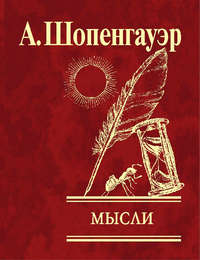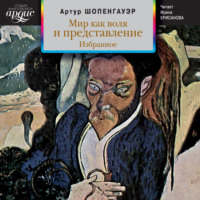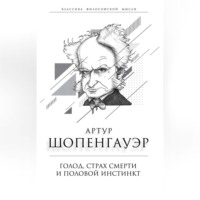 полная версия
полная версияThe World as Will and Idea (Vol. 2 of 3)
But we ought to know that inferior minds are the rule, good minds the exception, eminent minds very rare, and genius a portent. How otherwise could a human race consisting of about eight hundred million individuals have left so much after six thousand years to discover, to invent, to think out, and to say? The intellect is calculated for the support of the individual alone, and as a rule it is only barely sufficient even for this. But nature has wisely been very sparing of conferring a larger measure; for the man of limited intelligence can survey the few and simple relations which lie within reach of his narrow sphere of action, and can control the levers of them with much greater ease than could the eminently intellectual man who commands an incomparably larger sphere and works with long levers. Thus the insect sees everything on its stem or leaf with the most minute exactness, and better than we, and yet is not aware of the man who stands within three steps of it. This is the reason of the slyness of half-witted persons, and the ground of the paradox: Il y a un mystère dans l'esprit des gens qui n'en ont pas. For practical life genius is about as useful as an astral telescope in a theatre. Thus, with regard to the intellect nature is highly aristocratic. The distinctions which it has established are greater than those which are made in any country by birth, rank, wealth, or caste. But in the aristocracy of intellect, as in other aristocracies, there are many thousands of plebeians for one nobleman, many millions for one prince, and the great multitude of men are mere populace, mob, rabble, la canaille. Now certainly there is a glaring contrast between the scale of rank of nature and that of convention, and their agreement is only to be hoped for in a golden age. Meanwhile those who stand very high in the one scale of rank and in the other have this in common, that for the most part they live in exalted isolation, to which Byron refers when he says: —
“To feel me in the solitude of kings
Without the power that makes them bear a crown.”
– Proph. of Dante, c. i.For intellect is a differentiating, and therefore a separating principle. Its different grades, far more than those of mere culture, give to each man different conceptions, in consequence of which each man lives to a certain extent in a different world, in which he can directly meet those only who are like himself, and can only attempt to speak to the rest and make himself understood by them from a distance. Great differences in the grade and in the cultivation of the understanding fix a wide gulf between man and man, which can only be crossed by benevolence; for it is, on the contrary, the unifying principle, which identifies every one else with its own self. Yet the connection remains a moral one; it cannot become intellectual. Indeed, when the degree of culture is about the same, the conversation between a man of great intellect and an ordinary man is like the journey together of two men, one of whom rides on a spirited horse and the other goes on foot. It soon becomes very trying to both of them, and for any length of time impossible. For a short way the rider can indeed dismount, in order to walk with the other, though even then the impatience of his horse will give him much to do.
But the public could be benefited by nothing so much as by the recognition of that intellectual aristocracy of nature. By virtue of such recognition it would comprehend that when facts are concerned, thus when the matter has to be decided from experiments, travels, codes, histories, and chronicles, the normal mind is certainly sufficient; but, on the other hand, when mere thoughts are in question, especially those thoughts the material or data of which are within reach of every one, thus when it is really only a question of thinking before others, decided reflectiveness, native eminence, which only nature bestows, and that very seldom, is inevitably demanded, and no one deserves to be heard who does not at once give proofs of this. If the public could be brought to see this for itself, it would no longer waste the time which is sparingly measured out to it for its culture on the productions of ordinary minds, thus on the innumerable botches of poetry and philosophy which are produced every day. It would no longer seize always what is newest, in the childish delusion that books, like eggs, must be enjoyed while they are fresh, but would confine itself to the works of the few select and chosen minds of all ages and nations, would strive to learn to know and understand them, and might thus by degrees attain to true culture. And then, also, those thousands of uncalled-for productions which, like tares, hinder the growth of the good wheat would be discontinued.
Chapter XVI.26 On The Practical Use Of Reason And On Stoicism
In the seventh chapter I have shown that, in the theoretical sphere, procedure based upon conceptions suffices for mediocre achievements only, while great achievements, on the other hand, demand that we should draw from perception itself as the primary source of all knowledge. In the practical sphere, however, the converse is the case. Here determination by what is perceived is the way of the brutes, but is unworthy of man, who has conceptions to guide his conduct, and is thus emancipated from the power of what is actually perceptibly present, to which the brute is unconditionally given over. In proportion as a man makes good this prerogative his conduct may be called rational, and only in this sense can we speak of practical reason, not in the Kantian sense, the inadmissibility of which I have thoroughly exposed in my prize essay on the foundation of morals.
It is not easy, however, to let oneself be determined by conceptions alone; for the directly present external world, with its perceptible reality, intrudes itself forcibly even on the strongest mind. But it is just in conquering this impression, in destroying its illusion, that the human spirit shows its worth and greatness. Thus if incitements to lust and pleasure leave it unaffected, if the threats and fury of enraged enemies do not shake it, if the entreaties of erring friends do not make its purpose waver, and the delusive forms with which preconcerted plots surround it leave it unmoved, if the scorn of fools and of the vulgar herd does not disturb it nor trouble it as to its own worth, then it seems to stand under the influence of a spirit-world, visible to it alone (and this is the world of conceptions), before which that perceptibly present world which lies open to all dissolves like a phantom. But, on the other hand, what gives to the external world and visible reality their great power over the mind is their nearness and directness. As the magnetic needle, which is kept in its position by the combined action of widely distributed forces of nature embracing the whole earth, can yet be perturbed and set in violent oscillation by a small piece of iron, if only it comes quite close to it, so even a great mind can sometimes be disconcerted and perturbed by trifling events and insignificant men, if only they affect it very closely, and the deliberate purpose can be for the moment shaken by a trivial but immediately present counter motive. For the influence of the motives is subject to a law which is directly opposed to the law according to which weights act on a balance, and in consequence of it a very small motive, which, however, lies very near to us, can outweigh one which in itself is much stronger, but which only affects us from a distance. But it is this quality of the mind, by reason of which it allows itself to be determined in accordance with this law, and does not withdraw itself from it by the strength of actual practical reason, which the ancients denoted by animi impotentia, which really signifies ratio regendæ voluntatis impotens. Every emotion (animi perturbatio) simply arises from the fact that an idea which affects our will comes so excessively near to us that it conceals everything else from us, and we can no longer see anything but it, so that for the moment we become incapable of taking account of things of another kind. It would be a valuable safeguard against this if we were to bring ourselves to regard the present, by the assistance of imagination, as if it were past, and should thus accustom our apperception to the epistolary style of the Romans. Yet conversely we are very well able to regard what is long past as so vividly present that old emotions which have long been asleep are thereby reawakened in their full strength. Thus also no one would be irritated or disconcerted by a misfortune, a disappointment, if reason always kept present to him what man really is: the most needy of creatures, daily and hourly abandoned to innumerable misfortunes, great and small, το δειλοτατον ζωον, who has therefore to live in constant care and fear. Herodotus already says, “Παν εστι ανθρωπος συμφορα” (homo totus est calamitas).
The application of reason to practice primarily accomplishes this. It reconstructs what is one-sided and defective in knowledge of mere perception, and makes use of the contrasts or oppositions which it presents, to correct each other, so that thus the objectively true result is arrived at. For example, if we look simply at the bad action of a man we will condemn him; on the other hand, if we consider merely the need that moved him to it, we will compassionate him: reason, by means of its conceptions, weighs the two, and leads to the conclusion that he must be restrained, restricted, and curbed by a proportionate punishment.
I am again reminded here of Seneca's saying: “Si vis tibi omnia subjicere, te subjice rationi.” Since, however, as was shown in the fourth book, the nature of suffering is positive, and that of pleasure negative, he who takes abstract or rational knowledge as the rule of his conduct, and therefore constantly reflects on its consequences and on the future, will very frequently have to practise sustine et abstine, for in order to obtain the life that is most free from pain he generally sacrifices its keenest joys and pleasures, mindful of Aristotle's “ὁ φρονιμος το αλυπον διωκει, ου το ἡδυ” (quod dolore vacat, non quod suave est, persequitur vir prudens). Therefore with him the future constantly borrows from the present, instead of the present borrowing from the future, as is the case with a frivolous fool, who thus becomes impoverished and finally bankrupt. In the case of the former reason must, for the most part, assume the rôle of a churlish mentor, and unceasingly call for renunciations, without being able to promise anything in return, except a fairly painless existence. This rests on the fact that reason, by means of its conceptions, surveys the whole of life, whose outcome, in the happiest conceivable case, can be no other than what we have said.
When this striving after a painless existence, so far as it might be attainable by the application of and strict adherence to rational reflection and acquired knowledge of the true nature of life, was carried out with the greatest consistency and to the utmost extreme, it produced cynicism, from which stoicism afterwards proceeded. I wish briefly here to bring this out more fully for the sake of establishing more firmly the concluding exposition of our first book.
All ancient moral systems, with the single exception of that of Plato, were guides to a happy life. Accordingly in them the end of virtue was entirely in this life, not beyond death. For to them it is only the right path to a truly happy life; and on this account the wise choose it. Hence arise those lengthy debates chiefly preserved for us by Cicero, those keen and constantly renewed investigations, whether virtue quite alone and in itself is really sufficient for a happy life, or whether this further requires some external condition; whether the virtuous and wise may also be happy on the rack and the wheel, or in the bull of Phalaris; or whether it does not go as far as this. For certainly this would be the touchstone of an ethical system of this kind; the practice of it must give happiness directly and unconditionally. If it cannot do this it does not accomplish what it ought, and must be rejected. It is therefore with truth and in accordance with the Christian point of view that Augustine prefaces his exposition of the moral systems of the ancients (De Civ. Dei, Lib. xix. c. 1) with the explanation: “Exponenda sunt nobis argumenta mortalium, quibus sibi ipsi beatitudinem facere in hujus vitæ infelicitate moliti sunt; ut ab eorum rebus vanis spes nostra quid differat clarescat. De finibus bonorum et malorum multa inter se philosophi disputarunt; quam quæstionem maxima intentione versantes, invenire conati sunt, quid efficiat hominem beatum: illud enim est finis bonorum.” I wish to place beyond all doubt the eudæmonistic end which we have ascribed to all ancient ethics by several express statements of the ancients themselves. Aristotle says in the “Eth. Magna,” i. 4: “Ἡ ευδαιμονια εν τῳ εν ζῃν εστι, το δε ευ ζῃν εν τῳ κατα τας αρετας ζῃν.” (Felicitas in bene vivendo posita est: verum bene vivere est in eo positum, ut secundum virtutem vivamus), with which may be compared “Eth. Nicom.,” i. 5. “Cic. Tusc.,” v. 1: “Nam, quum ea causa impulerit eos, qui primi se ad philosophiæ studia contulerunt, ut, omnibus rebus posthabitis, totos se in optimo vitæ statu exquirendo collocarent; profecto spe beate vivendi tantam in eo studio curam operamque posuerunt”. According to Plutarch (De Repugn. Stoic., c. xviii.) Chrysippus said: “Το κατα κακιαν ζῃν τῳ κακοδαιμονως ζῃν ταυτον εστι.” (Vitiose vivere idem est guod vivere infeliciter.) Ibid., c. 26: “Ἡ φρονησις ουχ ἑτερον εστι της ευδαιμονιας καθ᾽ ἑαυτο, αλλ᾽ ευδαιμονια.” (Prudentia nihil differt a felicitate, estque ipsa adeo felicitas.) “Stob. Ecl.,” Lib. ii. c. 7: “Τελος δε φασιν ειναι το ευδαιμονειν, ὁυ ἑνεκα παντα πραττεται.” (Finem esse dicunt felicitatem, cujus causa fiunt omnia.) “Ευδαιμονιαν συνωνυμειν τῳ τελει λεγουσι.” (Finem bonorum et felicitatem synonyma esse dicunt.) “Arrian Diss. Epict.,” i. 4: “Ἡ αρετη ταυτην εχει την επαγγελιαν, ευδαιμονιαν ποιησαι.” (Virtus profitetur, se felicitatem præstare.) Sen., Ep. 90: “Ceterum (sapientia) ad beatum statum tendit, illo ducit, illo vias aperit.” – Id., Ep. 108: “Illud admoneo auditionem philosophorum, lectionemque, ad propositum beatæ vitæ trahendum.”
The ethics of the Cynics also adopted this end of the happiest life, as the Emperor Julian expressly testifies (Orat. vi.): “Της Κυνικης δε φιλοσοφιας σκοπος μεν εστι και τελος, ὡσπερ δη και πασης φιλοσοφιας, το ευδαιμονειν; το δε ευδαιμονειν εν τῳ ζῃν κατα φυσιν, αλλα μη προς τας των πολλων δοξας.” (Cynicæ philosophiæ ut etiam omnis philosophiæ, scopus et finis est feliciter vivere: felicitas vitæ autem in eo posita est, ut secundum naturam vivatur, nec vero secundum opiniones multitudinis.) Only the Cynics followed quite a peculiar path to this end, a path directly opposed to the ordinary one – the path of extreme privation. They start from the insight that the motions of the will which are brought about by the objects which attract and excite it, and the wearisome, and for the most part vain, efforts to attain these, or, if they are attained, the fear of losing them, and finally the loss itself, produce far greater pain than the want of all these objects ever can. Therefore, in order to attain to the life that is most free from pain, they chose the path of the extremest destitution, and fled from all pleasures as snares through which one was afterwards handed over to pain. But after this they could boldly scorn happiness and its caprices. This is the spirit of cynicism. Seneca distinctly expresses it in the eighth chapter, “De Tranquilitate Animi:” “Cogitandum est, quanto levior dolor sit, non habere, quam perdere: et intelligemus paupertati eo minorem tormentorum, quo minorem damnorum esse materiam.” Then: “Tolerabilius est, faciliusque, non acquirere, quam amittere… Diogenes effecit, ne quid sibi eripi posset, … qui se fortuitis omnibus exuit… Videtur mihi dixisse; age tuum negotium, fortuna: nihil apud Diogenem jam tuum est.” The parallel passage to this last sentence is the quotation of Stobæus (Ecl. ii. 7): “Διογενης εφη νομιζειν ὁραν την Τυχην ενορωσαν αυτον και λεγουσαν; τουτον δ᾽ ου δυναμαι βαλεειν κυνα λυσσητηρα.” (Diogenes credere se dixit, videre Fortunam, ipsum intuentem, ac dicentem: aut hunc non potui tetigisse canem rabiosum.) The same spirit of cynicism is also shown in the epitaph on Diogenes, in Suidas, under the word Φιλισκος, and in “Diogenes Laertius,” vi. 2:
“Γηρασκει μεν χαλκος ὑπο χρονου; αλλα σον ουτιΚυδος ὁ πας αιων, Διογενης, καθελει;Μουνος επει βιοτης αυταρκεα δοξαν εδειξαςΘνητοις, και ζωης οιμον ελαφροτατην.”(Æra quidem absumit tempus, sed tempore numquamInteritura tua est gloria, Diogenes:Quandoquidem ad vitam miseris mortalibus æquamMonstrata est facilis, te duce, et ampla via.)Accordingly the fundamental thought of cynicism is that life in its simplest and nakedest form, with the hardships that belong to it by nature, is the most endurable, and is therefore to be chosen; for every assistance, convenience, gratification, and pleasure by means of which men seek to make life more agreeable only brings with it new and greater ills than originally belonged to it. Therefore we may regard the following sentence as the expression of the kernel of the doctrine of cynicism: “Διογενης εβοᾳ πολλακις λεγων, τον των ανθωπων βιον ραδιον ὑπο των θεων δεδοσθαι, αποκεκρυφθαι δε αυτον ζητουντων μελιπηκτα και μυρα και τα παραπλησια.” (Diogenes clamabat sæpius, hominum vitam facilem a diis dari, verum occultari illam quærentibus mellita cibaria, unguenta et his similia.) (Diog., Laert., vi. 2.) And further: “Δεον, αντι των αχρηστων πονων, τους κατα φυσιν ἑλομενους, ζῃν ευδαιμονως; παρα την ανοιαν κακοδαιμονουσι… τον αυτον χαρακτηρα του βιου λεγων διεξαγειν, ὁνπερ και Ἡρακλης, μηδεν ελευθηριας προκρινων.” (Quum igitur, repudiatis inutilibus laboribus, naturales insequi, ac vivere beate debeamus, per summam dementiam infelices sumus… eandem vitæ formam, quam Hercules, se vivere affirmans, nihil libertati præferens. Ibid.) Therefore the old, genuine Cynics, Antisthenes, Diogenes, Krates, and their disciples had once for all renounced every possession, all conveniences and pleasures, in order to escape for ever from the troubles and cares, the dependence and the pains, which are inevitably bound up with them and are not counterbalanced by them. Through the bare satisfaction of the most pressing wants and the renunciation of everything superfluous they thought they would come off best. Accordingly they contented themselves with what in Athens or Corinth was to be had almost for nothing, such as lupines, water, an old threadbare cloak, a wallet, and a staff. They begged occasionally, as far as was necessary to supply such wants, but they never worked. Yet they accepted absolutely nothing that exceeded the wants referred to above. Independence in the widest sense was their aim. They occupied their time in resting, going about, talking with all men, and much mocking, laughing, and joking; their characteristic was carelessness and great cheerfulness. Since now in this manner of life they had no aims of their own, no purposes or ends to pursue, thus were lifted above the sphere of human action, and at the same time always enjoyed complete leisure, they were admirably fitted, as men of proved strength of mind, to be the advisers and admonishers of the rest. Therefore Apuleius says (Florid., iv.): “Crates, ut lar familiaris apud homines suæ ætatis cultus est. Nulla domus ei unquam clausa erat: nec erat patrisfamilias tam absconditum secretum, quin eo tempestive Crates interveniret, litium omnium et jurgiorum inter propinquos disceptator et arbiter.” Thus in this, as in so many other respects, they show a great likeness to the mendicant friars of modern times, that is, to the better and more genuine among them, whose ideal may be seen in the Capucine Christoforo in Manzoni's famous romance. Yet this resemblance lies only in the effects, not in the cause. They agree in the result, but the fundamental thought of the two is quite different. With the friars, as with the Sannyâsis, who are akin to them, it is an aim which transcends life; but with the Cynics it is only the conviction that it is easier to reduce their wishes and their wants to the minimum, than to attain to the maximum in their satisfaction, which indeed is impossible, for with their satisfaction the wishes and wants grow ad infinitum; therefore, in order to reach the goal of all ancient ethics, the greatest happiness possible in this life, they took the path of renunciation as the shortest and easiest: “ὁθεν και τον Κυνισμον ειρηκασιν συντομον επ᾽ αρετην ὁδον.” (Unde Cynismum dixere compendiosam ad virtutem viam.) Diog. Laert., vi. 9. The fundamental difference between the spirit of cynicism and that of asceticism comes out very clearly in the humility which is essential to the ascetic, but is so foreign to the Cynic that, on the contrary, he is distinguished beyond everything else for pride and scorn: —
“Sapiens uno minor est Jove, dives,
Liber, honoratus, pulcher, rex denique regum.” —Hor.
On the other hand, the view of life held by the Cynics agrees in spirit with that of J. J. Rousseau as he expounds it in the “Discours sur l'Origine de l'Inégalité.” For he also would wish to lead us back to the crude state of nature, and regards the reduction of our wants to the minimum as the surest path to happiness. For the rest, the Cynics were exclusively practical philosophers: at least no account of their theoretical philosophy is known to me.
Now the Stoics proceeded from them in this way – they changed the practical into the theoretical. They held that the actual dispensing with everything that can be done without is not demanded, but that it is sufficient that we should regard possessions and pleasures constantly as dispensable, and as held in the hand of chance; for then the actual deprivation of them, if it should chance to occur, would neither be unexpected nor fall heavily. One might always have and enjoy everything; only one must ever keep present the conviction of the worthlessness and dispensableness of these good things on the one hand, and of their uncertainty and perishableness on the other, and therefore prize them all very little, and be always ready to give them up. Nay more, he who must actually dispense with these things in order not to be moved by them, thereby shows that in his heart he holds them to be truly good things, which one must put quite out of sight if one is not to long after them. The wise man, on the other hand, knows that they are not good things at all, but rather perfectly indifferent things, αδιαφορα, in any case προηγμενα. Therefore if they present themselves he will accept them, but yet is always ready to let them go again, if chance, to which they belong, should demand them back; for they are των ουκ εφ᾽ ἡμιν. In this sense, Epictetus, chap. vii., says that the wise man, like one who has landed from a ship, &c., will also let himself be comforted by a wife or a child, but yet will always be ready, whenever the captain calls, to let them go again. Thus the Stoics perfected the theory of equanimity and independence at the cost of the practice, for they reduced everything to a mental process, and by arguments, such as are presented in the first chapter of Epictetus, sophisticated themselves into all the amenities of life. But in doing so they left out of account that everything to which one is accustomed becomes a need, and therefore can only be given up with pain; that the will does not allow itself to be played with, cannot enjoy without loving the pleasures; that a dog does not remain indifferent if one draws a piece of meat through its mouth, and neither does a wise man if he is hungry; and that there is no middle path between desiring and renouncing. But they believed that they satisfied their principles if, sitting at a luxurious Roman table, they left no dish untasted, yet at the same time protested that they were each and all of them mere προηγμενα, not αγαθα; or in plain English, if they eat, drank, and were merry, yet gave no thanks to God for it all, but rather made fastidious faces, and persisted in boldly asserting that they gained nothing whatever from the whole feast. This was the expedient of the Stoics; they were therefore mere braggarts, and stand to the Cynics in much the same relation as well-fed Benedictines and Augustines stand to Franciscans and Capucines. Now the more they neglected practice, the more they refined the theory. I shall here add a few proofs and supplementary details to the exposition of it given at the close of our first book.









